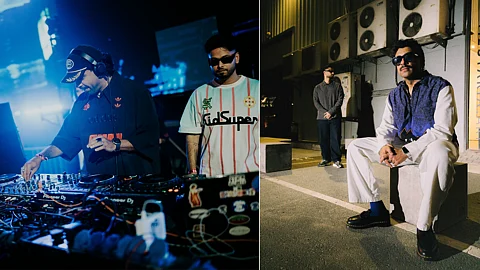
- HOMEGROWN WORLD
- #HGCREATORS
- #HGEXPLORE
- #HGVOICES
- #HGSHOP
- CAREERS
- ABOUT US
- CONTACT US

“Dubai is diversity,” says Jeftin James, co-founder of Stick No Bills, describing the city he grew up in. "But it doesn’t always act like it.” As one half of the Dubai-based DJ collective, Jeff has spent the last few years trying to cut through the invisible lines that fragment the city’s cultural spaces — the unspoken rules of where you party, who you party with, and what music you’re expected to hear. This fragmentation reflects how the city works, with different communities keeping to their own. But with Stick No Bills, those boundaries collapse at the door.
The collective has come to be knows as 'a soundboard for the South Asian diaspora'. It's members include Jeff, whose sets move through dusty Bollywood samples, trap snares, and amapiano log drums to create a genre-fluid sound shaped by years of DJing. GT, a resident DJ, builds emotionally-driven sets filled with chopped samples, R&B flips, and heavy basslines. Boss J Beats brings live energy to the room as an MC, known for his timing and ability to keep the crowd locked in. Each member brings their own approach, but together, they share a common focus: making music that reflects where they’re from and where they’re headed.
Stick No Bills emerged not as a declaration or representation but a desire. “We just wanted to create a space that felt exciting — something fresh compared to what we had all grown used to,” Jeff tells us. The project began as an instinct, shaped by the layered identities of its founders. Jeff grew up deeply embedded in Dubai’s South Asian community, a world that often needed to guard its joy which, he infers, makes a lot of sense when you grow up having to fight to see yourself in the spaces around you. His collaborator Aaron Ferns, meanwhile, moved through international circles more fluidly.
Their different upbringings became the collective’s architecture and city’s contradictions gave Stick No Bills its mission. “How do we bring together the community I grew up in, and the world Aaron grew up in — and create a space where they not only coexist, but amplify each other?” That question became the pulse of their events. They weren’t chasing diversity as a label, they were reflecting the complexity of Dubai’s reality — one that's messy, hybrid, and always shifting.
It became clear to the collective that they weren’t just curating a vibe, they were creating a place where people felt acknowledged in a world that doesn’t always do that for them. And with each gathering, the vision evolved. “The aim isn’t to create a monolith," Jeff states. "It’s to hold space for all the versions of being ‘us’ that exist.”
Music, in their hands then, becomes an expression of this complex identity. Jeff describes growing up as a third culture kid as constant code-switching. “You’re South Asian at home, but you’re also watching American TV, listening to British grime, growing up next to Filipinos and Sudanese and Lebanese kids.” That multiplicity shows up in their sets with South Asian percussion, UK garage, Bollywood edits, bass-heavy club tracks. But it’s not just genre-hopping. “Taste-making for us means trusting our instincts — not asking, ‘Will this work in a club?’ but asking, ‘Does this say something about us?’”
There’s narrative intent behind the noise — a desire to build emotional arcs through tension, release, memory and surprise. “The South Asian diaspora isn’t one thing — and neither is our sound," Jeff insists. And so they’re not afraid of friction either. Some of the most powerful moments, Jeff says, come from letting two worlds collide and letting the connection happen in real time.
As their reach expands — from dancefloors in Dubai to international platforms like NBA House, Wireless Abu Dhabi, and Sole DXB — Stick No Bills is thinking more deeply about how to carry their ethos with them. “The underground isn’t just a sound or an aesthetic — it’s a value system. It’s about intimacy, trust, and community.” In which case, it's not growth they're wary of but dilution.
This is something Stick No Bills is very protective of. It's also why they've said no to the 'shiny' things. “We’ve turned down opportunities that didn’t align... things that might’ve grown our reach, but not our roots.” Their measure of success isn’t metrics. It’s when someone walks in and says, "This feels like home."
"It’s when someone tells us they felt proud to bring their non-desi friends to the party and have them love it," Jeff reflects. "It’s when someone tells us this was the first time they heard their culture in a club and it didn’t feel like a gimmick."
As the collective looks ahead, the mission stays rooted: build community, not just crowds. Rewire the dance floor as a place of recognition. Stick No Bills isn’t aiming to stay underground forever — but wherever they go next, they’re carrying the spirit of where it all began.
Follow Stick No Bills here.
